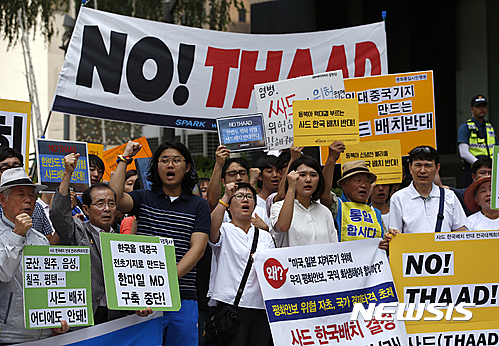Park Moo-jong – The Korea Times
China is a big country. No one can deny it.
The Communist country has the largest population of nearly 1.5 billion and occupies the fourth-biggest land in the world.
It is also the world’s second-largest economy only after the U.S.
But what the country has been doing, so far, proves it is not big, but little, compared to such countries as the Netherlands, which are small, but big.
Not only we, Koreans, but all the people of the free democratic world know China as an autocratic nation.
Such a country, mobilizing its national media, has gone all out to bash South Korea over its decision to allow the deployment of the U.S. THAAD missile defense system against a possible North Korean missile attack.
The country’s state-controlled mass media “warn” of harsh retaliation against the self-defense formula, even insulting South Korea’s head of state.
Their so-called retaliatory act is so cheap. Without any explanation, the Chinese Embassy in Seoul began to restrict the issuance of multiple-entry visas for businesspeople against prior practice.
A sold-out fan meeting with South Korea’s top hallyu stars in Beijing was canceled all of a sudden three days in advance.
In the face of the latest series of Beijing’s acts against Seoul, we need to look into history; a history of Chinese invasions of Korea.
The last Chinese invasion dates back only to 1950 during the Korean War (1950-1953). South Korean and United Nations forces were staring victory in the face when the “then” Chinese Red Army crossed the border in a human-wave attack to foil the unification of the peninsula by South Korea.
History shows that any Chinese invasions have been futile, as seen, for instance, in the “Salsu Daecheop” (great victory of Sal River or Cheongchon River) in 612 during the invasion of China’s Su Dynasty (581-619) into Goguryeo (BC 37-668) located in the northern part of the peninsula and northeastern region of present-day China.
The incredible victories over China’s greedy invasions to occupy the Korean Peninsula were the result of our ancestors’ united forces and fortitude. History tells us the answer. We should learn from history.
But more than serious now is a grave split in public opinion caused by the absurd claim of some politicians obsessed only with their political interests, progressives and residents shouting NIMBY (not in my backyard).
The reason for their support of China’s opposition to THAAD is simple: fear of the “big” country’s retaliation and the NIMBY phenomenon generated by wild rumors about the possible harm from electromagnetic waves from the military device.
It is no wonder that China is busy adding fuel to the fire in South Korea, making best use of protests and rallies and the inconsiderate visit of opposition lawmakers calling for the withdrawal of the deployment plan in concert with Beijing.
China’s threats have been compounded by the opposition side and the lawmakers relaying China’s menace.
China must have been happy and laughing behind the curtain as the Korean lawmakers did what they wanted.
THAAD is a security issue of the Republic of Korea over whether we can defend ourselves from North Korean nuclear missiles. The security issue has been argued over with China’s retaliation becoming a core question.
THAAD is not a system for attack but for defense as weapons experts explain. Rather, it is helpful for China and Russia in that it helps lessen the need for Seoul to seek other defense options like nuclear weapons.
Frankly speaking, the Korea-U.S. alliance is more important to us than Korea-China “honeymoon” relations.
For the peace and security of the nation in the present situation of extreme confrontation between North and South Korea, the United States should remain a strong ally as it used to be following liberation from Japanese occupation in 1945.
It was in September 1992 when Seoul normalized its diplomatic ties with Beijing after severing relations with the Republic of China, namely Taiwan. Over the past 24 years, China has grown to become the world’s second-largest economy.
Such a big economy is threatening its “trade partner” for its own ends to seize hegemony and increase its influence in Northeast Asia.
The “big” China is conflicting also with not only the West but also Southeast Asian countries and Japan, not to mention South Korea over various issues involving territory, regional security and fishing rights.
Such a China raises old questions anew. Should Xingang and Tibet, for instance, belong to China? History shows that many Chinese dynasties had tried, in vain, to occupy their neighboring Korean kingdoms and thus had collapsed.
The South Korea of today is capable of overcoming Chinese retaliation, either political or economic.
We have many cards to confront China. There is the ROK-U.S.-Japan cooperative system and the ROK-U.S. alliance.
What’s important, however, is our own attitude. What we have to worry about now is not the Chinese cheap threats, but our internal problems.
First of all, our esteemed politicians should be free from their deep-rooted obsession of doing anything, right or wrong, in service of political gains without seeing the big picture.
The enemy within spells defeat in war.
National unity is the sole weapon to overcome the enemy without.





